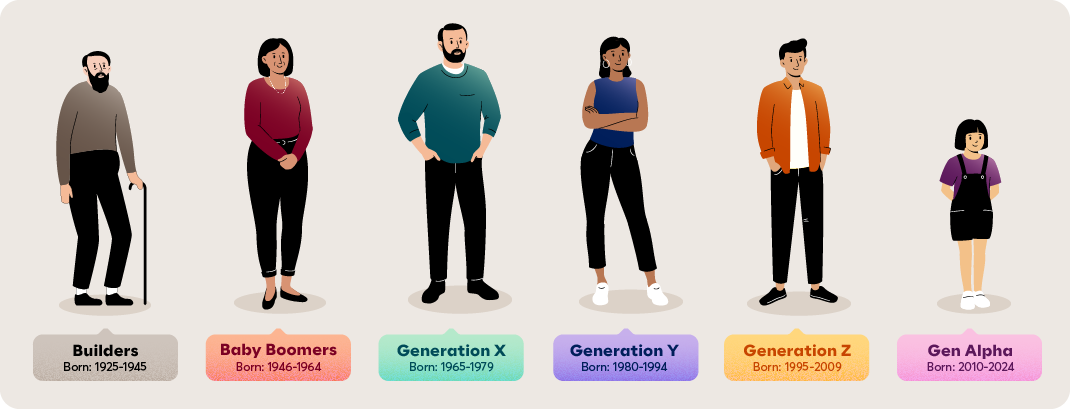How (newer) generations balance lifestyle

Generations are called the cohorts of people born between certain years, having in common one or more major characteristics. It was fun to study them a bit and understand how socio-economic realities shaped the way they prioritized work, family, personal time and so on. Let me take you through a quick view on how this looks like. We’ll start with the older generation still alive and kicking 😉
A glimpse over today’s generations
There are six generations currently still alive on our planet, each of them shaped by the realities of the world they were born and lived into.

The builders
The Builders, or those born before 1946, are the people who made a lot of what our world is today. They’ve been through hard times, like growing up after a Depression, hearing stories of World War I from their parents and living through World War II. They’re often called the older people in our communities, but they weren’t always old. They built our neighborhoods, schools, and roads, and they still contribute in their own ways. They stand strong for the important ideas and promises our communities are based on. They’re also good at understanding and changing with the times, and they respect the younger people who are growing up in a very different world from the one that shaped them.
Characteristics of this generation are the fact they were very hardworking, carrying strong work ethics, and they have the willpower to overcome all adversities coming their way. They’re loyal, staying with the same company for years, they respect authority and are very traditional in the way they do things: this generation values morale, security, safety, and consistency. Their focus was clearly on work, as that was their only chance to overcome and survive the hard times they lived through.
Baby boomers (approx. 80 million today)
People born from 1946 to 1964 are now between 60 and 78 years old and are known as baby boomers. This name comes from the big increase in births after World War II, with an average of 3.5 children per woman. This empowered generation shaped society and the social context. They pushed back on political decisions, participated in protests, saw the rise of feminism, and had a desire for equality. They are known for the pivotal roles they’ve played in the civil rights movements such as Woodstock or the Vietnam War.
They grew up in a time of big changes and learned to rely on themselves, work hard and right, and take on responsibilities without fear. But they’re also very competitive, aiming for the top in their jobs, focused on their goals, and very organized in how they do things. They also really believe in working together and helping each other out to fix problems.
Baby boomers prefer face-to-face communication. They expect everyone to work very hard and are seen as wanting too much, caring a lot about money, and being very driven. They’re not as into technology like smartphones, but they do like inventions like the microwave that make life easier. They used to make phone calls and write letters to keep in touch and see tablets and smartphones mainly as tools for getting things done.
For them, a balanced lifestyle was close to nonexistent, work often came before everything else, with both men and women working hard to support their families. There’s a well-known disagreement between baby boomer women who tried to “do it all” and Gen X or Millennial moms that are working part time or not having a job but the one of raising their children.
Generation X (approx. 50 million today)
This generation was born between 1965 and 1979 and was initially called “Gen Bust” given the birth rates were so much lower than of the Baby Boomers. The X label came from Douglas Coupland, referring to this generation’s mantra of anti-establishment and mindset of pushing back on authority figures.
They are the generation whose parents were workaholic; therefore, they are focused more on a balanced lifestyle. They grew up as “latch-key kids,” either by two working parents or by a single divorced one. As a result, they postponed getting married and having children, putting their personal development first.
Generally, this came with a decreased level of loyalty towards a particular company, as their values are more around development, growth, informal work environment, fun and balanced, being quite susceptible at the boomer’s way of seeing the world. They focus on personal development both at work as well as in their personal life.
In terms of technology, they’re a genuinely hybrid generation. They use Facebook, but 80% use the desktop option, and will always go for TV over streaming. They are also very generous and prefer working for and buying from companies that do something good for the community they’re part of or contribute to global issues.
Generation Y, or the Millennials (approx. 75 million today)
Gen Y is the first ones to reach adulthood in the new millennium, being born between 1980 and 1994. They are the young tech gurus that strive for innovation, flexibility, working from anywhere, and building startups. They grew up with parents that wanted to be less authoritative and more like partners; therefore, they had the opportunity to make their own rules.
Compared with the Baby Boomers that met their spouses via friends and real-life social networks, Millennials use dating websites, technology being an integrative part of their lives. Given the time spent and how they use it, Gen Y has less interpersonal skills, and as a result, depression is rampant amongst them. They are known as narcissists, confident, entitled, and depressed at the same time.
Millennials hope to turn back all the wrong they see in the world. They’re very educated, grew up with many opportunities at hand, they are competitive but also feel part of a global community. Still, they live in a time when everything is costly, and the pressure to buy a home, keeping a good job and getting married is very high. This reality results in mental illnesses, loneliness, and depression levels never seen before.
In the workplace, they look for flexibility, casual dressing, working from home, and all in all, are adept of working smart rather than hard. They respect competence, not hierarchy, have an opinion, seek responsibility, want to have fun, and appreciate independence. They’re very ambitious, like to multitask, value contribution, and have an entrepreneurial mindset.
Millennials are spenders, not savers. They are online 24/7 and share their thoughts and feelings on social media platforms. Health is essential to them, despite the general initial sense of them being lazy. They’re very hardworking, out of the box thinking generation. Millennials appreciate big brands, especially the ones that prove integrity and honesty in the way they do things, like fair-trade sourcing, organic growing, and other actions that help combat global warming. They are more prone to watch good advertising when deciding what to buy, but still, skip ads and install ad-blockers as they feel unsolicited ads are just disruptive.
Balancing all these require a lot, given life complexity nowadays, but Millennials are the first generation to truly seek it as they are understanding its need and necessity. Today, this generation are entering the parent and family life stage as they move into their 30s and 40s, and shape up a new generation of adults based on their life experience and views of the world.
Generation Z (approx. 80 million today)
Generation Z, born from 1995 to 2009, is growing up in a world that’s been hit by the COVID-19 pandemic, teaching them early on that economies can face major challenges. This has made them more cautious both with their money and socially, but it’s also made them more resilient.
This generation sees social media as a vital part of their life, one that will help them be famous, connected, and successful. All of them use Facebook, Instagram, YouTube, and WhatsApp permanently. They prefer individualized products, the “i” in iPad, iPhone, and iTunes suggesting precisely that. They have their own style in the way they express themselves, like to travel a lot, love to swipe, text and video message, and demand 24-hour access to the internet and social platforms. Still, they value diversity and non-discrimination.
By 2020, they’re set to be the biggest group of shoppers, making up 40% of buyers in the West and 10% worldwide. Even as young people, they have a big say in what their families buy. Growing personally is very important to them. They like shopping online, trust reviews from friends the most, need things to be available right away or they’ll go somewhere else, and are good at ignoring stuff they don’t care about online.
Gen Z looks for realness, easy access, and quick choices in everything from jobs to shopping. They take their education seriously, knowing it’s key to their early years. They understand that to stand out in a tough world, they need to keep learning and improving their skills, rather than expecting one job to last their whole life. They’re all about learning throughout their lives.
The extra challenge for them in terms of a balanced lifestyle is how to manage the 24/7 online availability without falling into its trap. Social media and the illusion of being always on can leads to severe social issues and illness – problems the modern world seems to be talking more and more about, both in terms of acknowledgment, but also in terms of finding solutions.
Generation Alpha, or the Glass Generation
Generation Alpha, born from 2010 to 2024, marks the beginning of a new era as the first group fully emerging in the 21st Century.
The COVID-19 pandemic, growing global connections, and their own digital empowerment say much about who they are. It’s important to realize they’re growing up in a completely different world, one that’s shaping them in unique ways, unlike any previous generation.
They’re set to be the most well-educated, tech-savvy, and financially well-off compared to those before them. Their teenage years will start earlier but stretch out longer, as they’ll likely delay traditional adult milestones like marriage, having kids, buying a home, and settling into careers. They’ll be sophisticated from a young age in social, educational, psychological, and commercial aspects, which brings both good and bad outcomes. For them, finding a balance in life is crucial, as they navigate a world full of both chances and challenges.
In 2010, when the first of Generation Alpha were born, Instagram was launched, the iPad came out, and the term “App” became essential. Hence, they’re sometimes called the Glass Generation. If Millennials and Gen Z were the first to grow up with digital technology, Alpha takes it further, with technology being a seamless part of their lives. They’ll use devices like smartwatches, smart glasses, driverless car displays, and interactive walls at school, malls, and home, changing how they interact, shop, learn, and connect.
As technology advances faster than ever, this new generation is expected to not just keep up but push the boundaries further, all while being mindful of the planet they want to preserve.
What’s in it for us?
As we can see the only given across generations was a constant change and evolution, with technology speeding everything up. We live in a fast-paced world, where we have access to everything anytime, where we must take hundreds of decisions every day, and all in all the opportunity to do more about anything we want to focus our attention and lives on.
With this opportunity though comes great risk – the risk of falling into various traps: burn out, brain fatigue, social isolation, anxiety, depression, obesity and many more. It’s a result of not knowing how to balance all the great things we have within reach. It’s a result of adjustments and trials and errors of the new world. It’s a result of the lack of better judgement, poor education or unknown.
More than ever, we need to prioritise ourselves. We notice a trend of people moving away from big, crowded cities, preferring a slow-paced lifestyle, closer to nature, where they can stay connected with what truly matters to them. More than our studies, jobs, accomplishments, families, we need to understand that before we can contribute to making a better world, we need to be okay with ourselves.
Have you got a moment to ponder it all out? Have you got time for this? How’s your soul doing?

